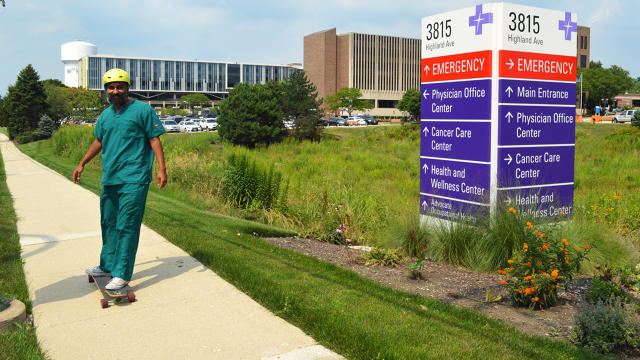These 4 Hobbies Can Actually Improve Job Performance
While downtime of any kind can help relieve stress, there are several science-backed ways that let you enjoy life outside of the office while improving your productivity within it.
Research conducted by Kevin Eschleman, an assistant psychology professor at San Francisco State University, suggests hobbies that are less relevant to one’s career are paradoxically more beneficial for it.
“Whatever the activity is that you’re doing in your free time, it becomes incredibly more valuable if it is different from what you’ve been doing most recently in your work environment,” Eschelman told Fast Company in a previous interview. “People need to be mindful and aware of what resources they’re using in the work environment to realize which resources they need to protect and refuel in their free time,” he said.

More Creative Commutes
Finding a more creative way to get to work isn’t just a good way to save money and the environment while getting a little exercise, but actually helps employees better prepare for the day ahead. Whether your preferred mode of transportation is a bike, rollerblades, or skateboard, spending a little bit of time outdoors before heading into work has been proven to result in higher engagement at the office.
“Years ago, when I commuted by car, I recall being frustrated and tired by the time I arrived at work after sitting in traffic,” says Sibu Joseph. The 40 year-old MRI technician at Advocate Good Samaritan Hospital in Downers Grove, Ill., has been skateboarding to work for the past 10 years. “At the beginning of my shift at the hospital, I arrive alert and energized,” he tells Fast Company, “At the end of my shift, I look forward to jumping back on my board to head home; my energy is up when I walk in the door because I’ve just spent a little time in the fresh air.”

Joseph believes that those who dismount from a skateboard (or another self-powered mode of transportation) before heading into work are more in touch with their surroundings than those who crawl out of their cars.
“Another benefit is a sense of closeness with my neighborhood because I’m able to meet and chat with neighbors working in their yards or walking their dogs,” he says. “I also feel like I’m setting an example to my children that it is possible to create a life that honors and respects our environment,” Joseph adds. “That’s very important to me.”
Improv Comedy
Improvisational comedy is, by definition, fun and games, but the career benefits those activities can provide go well beyond the silliness of the moment. Learning to master the “Yes, And” technique of improv comedy, for example—in which players build on the ideas suggested by others—is just one of the many lessons improv comedy practitioners can bring to the office.
“‘Yes, And’ gives you the orientation to take what’s in front of you and turn it into something that is scalable,” said Steve Johnston, the president and managing partner of Second City Works, the improv comedy troupe’s training division. “You approach ideas with an ability to explore and heighten—rather than question and parse. The key is to allow for a bit of ambiguity,” he explains, “Let the unknown be a part of the discovery of what becomes known.”
Programs like Second City Works can also help career professionals deliver more engaging presentations, become more confident at work, and learn how to think on their toes. “Change, risk, adaptability; that’s the norm when you improvise. We are teaching the skills you need to draw on in the mess of a real working day,” adds Johnston.

Music
Whether you’ve mastered an instrument or the art of compiling a killer playlist, the benefits of music on brain chemistry, focus, and attention are well documented.
“Learning how to play a musical instrument and becoming a musician is an exercise in developing good listening skills, experimenting, overcoming repeated failure, self-discipline, and successful collaboration,” wrote entrepreneur and music major Panos Panay. He wrote in Fast Company:
“It is simply impossible to become a successful music professional unless one also masters certain theoretical concepts, develops good presentation, and improvisational skills and, ultimately, attains that elusive quality of originality that only comes once fear of failure is overtaken by the desire to acquire a new insight, a fresh perspective, and a unique voice.”
Playing Video Games
In spite of what your parents may have told you on a sunny day that you spent on the couch with a joystick in hand as a child, video games can actually make you a better employee.
“Consider any video, phone, or tablet game you play: Your success rests on the series of discrete, split-second decisions you make. Most games offer hints and guides to help you make them, but the better a player you become, the fewer tips you need to do well,” wrote independent management consultant Caroline Siemers for a story in Fast Company. “Careers are similar,” Siemers explained. “Starting out, you rely on a handful of mentors who critique your work, offer tips, and show you how to work the coffee machine. But as you leveled up, those helpers grow scarcer and you begin relying on your own expertise.”
Fast Company , Read Full Story
(7)














